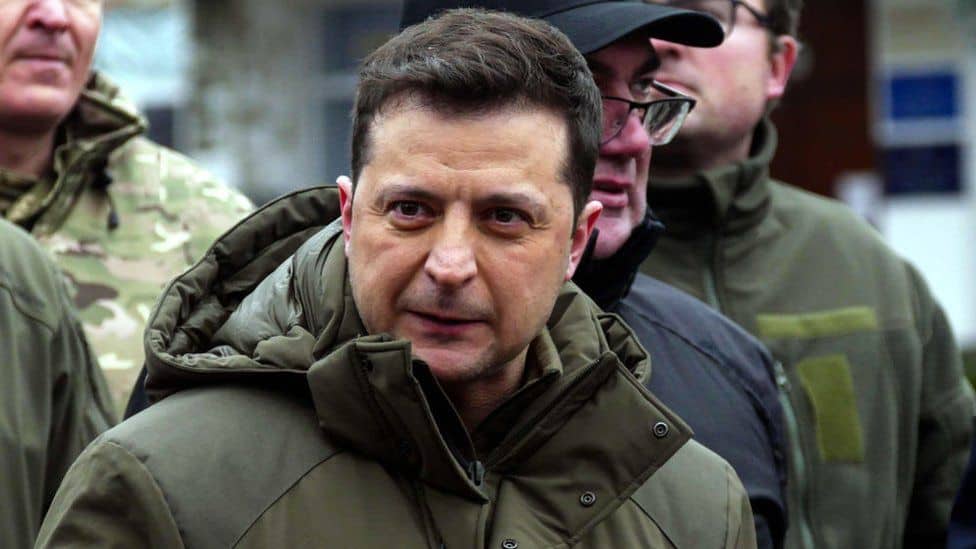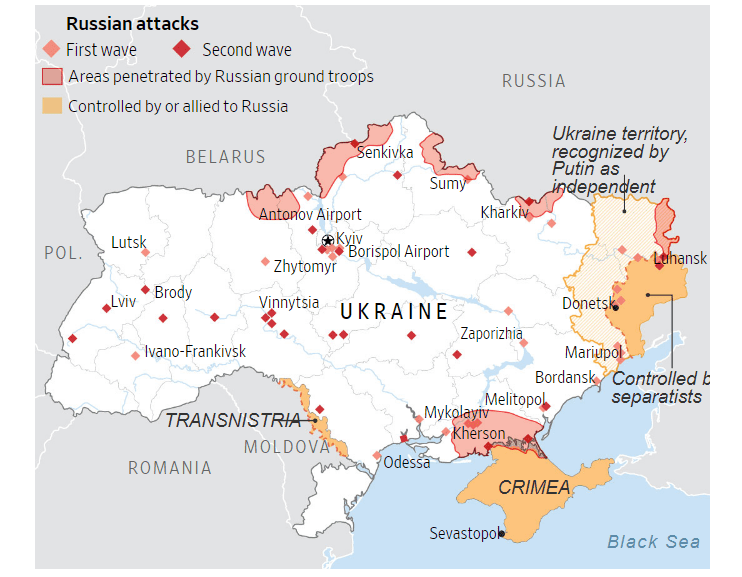World
Russian Forces Close In on Ukraine’s Capital as Kyiv Prepares to Fight
First American News LLC-Raleigh, NC: Russian forces closed in on Kyiv, attacking by land and air on Friday, while Ukrainian soldiers and civilians dug in to defend the capital. Ukraine’s president vowed not to surrender.
Moscow signaled an openness to talks with Kyiv. But shortly after, Russian President Vladimir Putin excoriated Ukrainian counterpart Volodymyr Zelensky, calling him a terrorist and urging Ukraine’s military to oust him, dimming prospects for diplomacy.
Firefights erupted in several areas of Kyiv, including the center, throughout the night into Saturday morning local time as Russian airstrikes continued. Ukrainian officials said Russian saboteur groups were trying to operate in the Ukrainian capital.

“This night they will begin to storm,” Mr. Zelensky said late Friday night. “We all have to know what awaits us, and we have to withstand. The fate of Ukraine is being decided right now.”
Ukrainian officials urged residents to seek shelter.
South of Kyiv in the town of Vasylkiv, which hosts a major Ukrainian air base, local authorities reported a large Russian airborne landing attempt. Intense fighting was going on in Vasylkiv early Saturday morning, and Ukraine’s military reported downing a Russian troop transporter plane. There was no immediate confirmation of that claim.
If Russia succeeds in controlling Vasylkiv, it would effectively surround Kyiv, cutting off the flow of reinforcements and supplies from the south.
Ukrainian troops blew up several bridges leading into Kyiv from the northwest to slow the progress of Russian armored columns that had moved south toward the city from Belarus. Ukrainian tanks and artillery were positioned to repel a ground assault, and the city braced for the prospect of the street-by-street fighting of urban combat.

Elsewhere, battles raged Friday around Ukraine’s second-largest city, Kharkiv, in the country’s east close to the Russian border, and near the southern city of Kherson, which was under assault from Russian forces that pushed in from Crimea. Russia said it captured the northern city of Chernihiv, a claim officials in Kyiv denied.
Ukraine’s military was able to withstand the shock of the initial Russian assault. As Kyiv prepared for a prolonged defense, Ukrainian officials sought help from the U.S. and other Western governments, and warned of the consequences if they were defeated.
President Biden on Friday night signed a memorandum on “immediate military assistance to Ukraine,” authorizing up to $250 million for overall assistance and $350 million for “defense articles and services of the Department of Defense, and military education and training.”
White House press secretary Jen Psaki on Friday warned that “Kyiv falling is a real possibility.” She went on to say, “Even as we see resistance on the ground, Russia’s military continues to advance toward Kyiv.”
Mr. Putin’s broad offensive raises the risk that violence could spill over into other parts of Europe. A swift victory by Moscow would drastically remake the security equation on the Continent, giving Russia the potential to place large forces right on the doorstep of the North Atlantic Treaty Organization.
“More than 40 hours of resisting Russian occupiers prove that we have the strongest army in Europe and a fearless people,” said Ukraine’s defense minister, Oleksii Reznikov. “Ukrainians are now fighting for the future that they deserve. For themselves and for all of Europe.”
On Friday, Mr. Zelensky spoke by phone with President Biden. A White House official said the call lasted about 40 minutes. Mr. Zelensky wrote on Twitter, “Strengthening sanctions, concrete defense assistance and an anti-war coalition have just been discussed with @POTUS.”

A person familiar with the matter said the Biden administration has asked Congress for $6.4 billion in additional funding for Ukraine aid and defense needs.
Ms. Psaki said the U.S. would impose sanctions on the state-owned Russian Direct Investment Fund, a sovereign-wealth fund, and the State Department said Washington had paused talks with Moscow on the future of arms control and strategic stability.
U.S. and European Union officials also said Friday they plan to impose sanctions on Mr. Putin and Russian Foreign Minister Sergei Lavrov.
Australia announced that it will sanction eight Russian oligarchs who are close to Mr. Putin, as well as 339 members of Russia’s parliament. Australia’s foreign minister, Marise Payne, said officials are seeking to follow other allies in sanctioning Messrs. Putin and Lavrov.
On Friday, Kremlin spokesman Dmitry Peskov told reporters that Moscow was willing to send a delegation to meet Ukrainian representatives in the Belarusian capital, Minsk, according to Russian news agencies. The offer followed a video statement by Ukraine’s Mr. Zelensky calling on Mr. Putin to meet for talks.
Afterward a Russian Foreign Ministry spokeswoman said Russia was ready for negotiations, but that its war aims, which include the demilitarization of Ukraine and the removal of its government, remained the same.
Late Friday, Russia was the only country to vote “no” on a U.N. Security Council resolution aimed at ending the war in Ukraine. But its veto power on the 15-member council blocked the resolution from passing. China abstained from voting on it.
Western officials said Russia had moved about 60 battalion tactical groups into Ukraine, about half of the force it had massed on the border with the country, and that its progress had been slower than analysts had predicted. The officials said Russian troops were roughly 30 miles from Kyiv.
If they fight their way into the capital, the Western officials warned, Mr. Zelensky would likely be a target. In a late-night televised address, Mr. Zelensky said Ukraine faced a tough night, with Kyiv in particular under threat. “We can’t lose the capital,” he said.
Stiff Ukrainian resistance was evident Friday as troops—including recently enrolled volunteers in civilian dress—took positions in hastily dug trenches in the woods around Kyiv. With Ukrainian artillery and armor deployed nearby, they braced for a Russian offensive.
Mr. Zelensky late Thursday told a gathering of European leaders by video, “This might be the last time you see me alive,” according to two European officials familiar with his comments. “I don’t know how much we’ll be able to hold. Russia is shelling civilian targets.” A spokesman for Mr. Zelensky declined to comment when asked if the quote was accurate.
A senior EU official described Mr. Zelensky’s call as harrowing and “chilling to the bone.”

By early afternoon Friday, reinforcement columns of Ukrainian armored vehicles were headed into Kyiv as fleeing city residents, whose vehicles clogged the outbound lane, got out of their cars to cheer and flash victory signs.
Ukrainian Mig-29 jet fighters roared low overhead, showing Ukrainian insignia on their wings—a sign that Russia, despite its formidable advantage in aviation and two days of relentlessly bombing Ukraine’s air bases, still hadn’t achieved full control of the skies.
On Friday morning, gunfire erupted in several Kyiv neighborhoods, in what Ukrainian officials said were clashes with Russian infiltrators, some of them dressed in Ukrainian uniforms. Later in the day, witnesses said, shooting seemed to subside.
Casualty figures were unclear, but each side put the other’s death toll in the hundreds. Ukraine said dozens of civilians also died in Russian airstrikes on its cities. Mr. Zelensky said in his televised address that Russian rocket attacks had hit an orphanage and a kindergarten.
In Kyiv, Russian airstrikes shook the city center before dawn Friday, and continued sporadically through the day. Thousands of residents spent the night in underground subway stations that had been converted to bomb shelters. A residential high-rise went up in flames after being hit in the east of the city.
The bombing in Kyiv on Friday was much heavier than Thursday’s airstrikes, which also hit residential areas. Just past 4 a.m. in Kyiv’s Darnitsa neighborhood on the east bank of the Dnipro River, large fragments of a ballistic missile struck a complex of residential buildings, according to military officials at the site. Rescue workers said there were fatalities.
Reports, which were conflicting, suggested the blast resulted from a drone or a missile downed by Ukrainian air-defense forces. One man said he was at home when the strike happened. “I went out on the balcony to have a smoke and something hit,” he said. “Now I can’t hear anything.”
The explosion carved a crater in the ground at the base of a 10-floor apartment block and blasted completely through scores of apartments, blowing out windows on either side. Fires lighted up the night sky. The windows of a kindergarten 50 yards from the blast were also blown out.
Dazed residents wandered the site hours afterward. Roman Karmazin, 47, gathered what clothes he could carry, including shoes for his 6-year-old son, Artem. “What are we going to do now?” he asked.

